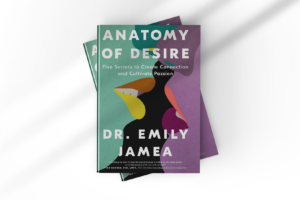
Great Day Colorado: Therapist Dr. Emily Jamea stops by GDC to showcase new book ‘The Anatomy of Desire’
If you’re in a relationship, we know it can come

Dr. Emily Jamea contributes to the discussion of why sexual activity saw such a decline during lock down.
Analysis by Ian Kerner, CNN
When Covid-19 first hit, I stopped getting as many inquiries from new patients for sex therapy. “Finally,” I thought, “people are having sex!”None of the old excuses — like working late, dinner obligations, a rough commute — to get in the way. And with nothing else to do on a Friday date night, why not sex? Boy, was I wrong. Our libidos are like the stock market. At a high level they go up or down, but when you look closely, there are numerous factors — physical and psychological — affecting those fluctuations. And in the age of Covid-19: We’re exercising less, eating more, drinking and smoking and vaping to escape the anxiety — all of which affect our sexual health and self-esteem.
We might not change out of our pajamas or shower as regularly, which affects attraction. We’re largely shut off from the outside world and its external stimuli, and more on top of each ever than ever before. And that’s leading to anger, resentment, and a sense of relational claustrophobia. There’s research to support what we’ve all been feeling: One meta-analysis of seven studies from the United States, China, Turkey, Italy and the United Kingdom examined the effects of Covid-19 on people’s sex lives and found a decrease in partnered sexual activity during the pandemic. Other research found that the effects of forced prolonged cohabitation during the lockdown led partners to turn to more masturbation and porn use and less to sex with each other. But spring — and optimism — is in the air, and it’s time for a sex recharge. In my work, I help people fix their sex lives by really paying attention to what works and doesn’t work in what I call the “sex script.” From the first moments of initiation to the final moments when someone rolls over and reaches for their cell phone, every sexual event tells a story that has a beginning, middle and end.
My goal is to help couples rewrite their sex scripts, often away from pain and toward pleasure. Prompted by my questions, patients will describe a recent sexual event in step-by-step detail. For example, “So, how did you get started? Who initiated? Of all the things you could have been doing at the time, how did it end up being sex?”You can rewrite your own sex script and generate desire, too — even during a pandemic. Here’s how.
See it as an opportunity. While you might be eager to reclaim your pre-pandemic life, change doesn’t happen overnight. “Instead of being critical of yourselves, see this as an opportunity to connect, much like you did when you were first getting involved,” suggested sexologist Yvonne K. Fulbright.”There is a newness to intimacy, in that we’re all slightly different people after the last 15 months,” she said. “Don’t put pressures on yourselves to rush back to your old routines, but thoughtfully consider how this next chapter of your love affair can be even better.”
Be intentional. “Many of us think of sex as a passive — or worse, automatic — function of the body,” said sex therapist Emily Jamea. But nothing could be further from the truth. Instead, many people, particularly those of us in long-term relationships, have to be more intentional about creating desire. “Throw off those tired old sweatpants and ratty T-shirts. Replace them with something sexy and sensuous,” sexuality educator Jane Fleishman said.
Read the full article at CNN Health.

If you’re in a relationship, we know it can come

Not quite at it like rabbits? From trying to be

Emily Jamea, Ph.D., is a sex therapist, author and podcast host. You